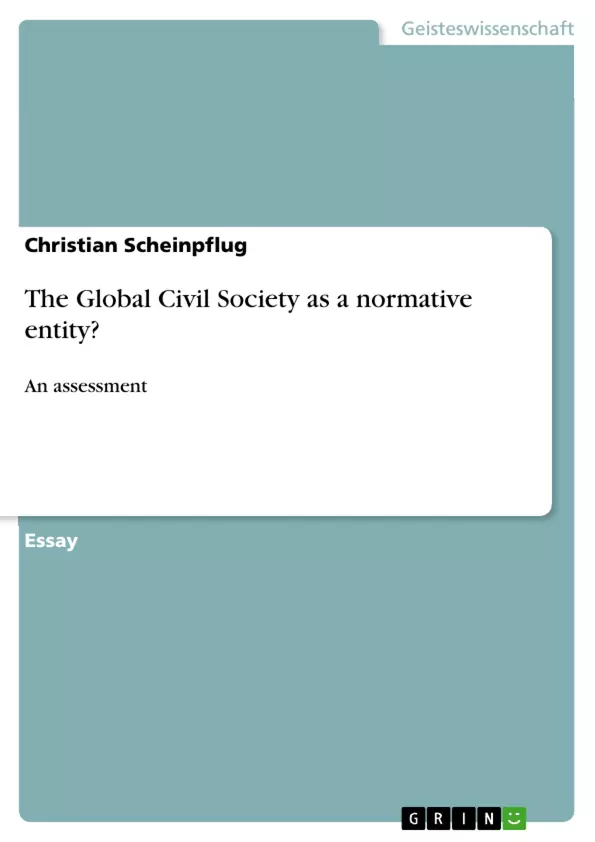The capacity of individuals to influence international politics via modern international communication technologies (ICT’s) that enable instant communication has never been greater. Some go as far as to claim that foreign policy can no longer be an elitist affair (Bullion, 2009, p. 122). This statement implies that there are entirely new ways to express dissent, and challenge social orders. The aim of this essay is to evaluate whether those opportunities and challenges are formulated by a global civil society, or whether they are outcomes of sophisticated technological advancement that allows for closely co-ordinated transterritorial collaboration but do not fundamentally change the way interaction in the international system takes place.
The Global Civil Society as a normative entity? An assessment
The capacity of individuals to influence international politics via modern international communication technologies (ICT’s) that enable instant communication has never been greater. Some go as far as to claim that foreign policy can no longer be an elitist affair (Bullion, 2009, p. 122). This statement implies that there are entirely new ways to express dissent, and challenge social orders. The aim of this essay is to evaluate whether those opportunities and challenges are formulated by a global civil society, or whether they are outcomes of sophisticated technological advancement that allows for closely co-ordinated transterritorial collaboration but do not fundamentally change the way interaction in the international system takes place.
Case studies about networks of dissent, here treated as reifications of a civil society, like al-Qaeda (AQ) and Jubilee 2000 (J2K), complement the discussion. In the main the argument is put forward that both a Marxist and social constructivist view explain the emergence of such networks in the first place, in conclusion, however, it is Realism that can claim most validity because empirical evidence indeed suggests that those networks remain secondary actors in an anarchic realm that is dominated by states as prime actors.
There is no universally agreed definition of what constitutes a civil society. At the minimum and for the purpose of this essay it is best seen as a space that anchors social orders but also exposes them to human agency and therefore potentially to change (Yanacopulos and Mohan, 2004, p. 417). More precisely, this space is couched between the private and the public sphere and enables participants to take part in some sort of ‘diffused democracy’ – the ability to bundle interests and values into one collective that is able to influence decision-making (Yanacopulos and Mohan, 2004, p. 428). Antonio Gramsci, drawing on the Marxist school, adds power to that notion when he asserts that in this sphere dominant classes push their ideas against the opposition of other classes, without resorting to blunt violent means. Specifically, Gramsci has in mind the legitimization of capitalism, under which dominant classes are able to extract profit (Yanacopulos and Mohan, 2004, p. 424). Closely related to the opening of this space is the proliferation of the capitalist mode of production, which is based on capital accumulation and relies on innovative technological input to reproduce itself and generate profit. Social constructivists, on the other hand, maintain that civil society developed as the third stage of global integration into the capitalist system. The first and second stage involved political and economic interaction within the international system; in the third stage, civil society adds ideational interaction (Wendt in Bromley and Brown, 2004, p. 12). For neo-Realists this space is less relevant because ultimately it relies on the benevolence and security provision of the nation-state.
Networks of dissent could be seen as expressions of a civil society. They oppose current social, economic and political orthodoxies and aim to exert influence on the way things are run (Yanacopulos and Mohan, 2004, p. 417). The existence of such networks, from a social constructivist view, is a strong empirical claim that the notion of a global civil society stands on empirical grounds, because an idea comes to life. Inequalities and communication play an integral part of building this idea.
J2K for example rallies behind social aims, like cancellation of debt developing countries owe developed ones; whereas al-Qaeda (AQ) pursues political goals - as when it unleashed a violent campaign to establish a global caliphate that does away with perceived injustices Muslims have to suffer at the hands of ‘infidels’.
ICT’s like internet or mobile telephony enabled these networks to grow into veritable single actors. Without hitherto existing smaller campaigns pursuing similar goals, however, they could not have grown as strong (Bullion, 2009, p. 111/101). The role of modern ICT’s is important because instant communication and data transmission enables the creation of a sense immediacy and identification to the cause, across territorial boundaries. This ability is often being cited in favour of the existence of a global civil society (DU 301, Audio 7).
The role of efficient production methods, often employed in modern companies that compete in a capitalist market economy, can be observed in the makeup and operational conduct of networks. J2K, for example, employed professional public relations methods of framing issues in the language targeted audiences understand, and connecting the main issue to cultural traditions and spreading the message via ICT’s. This led to maximum exposure within the public realm (Yanacopulos and Mohan, 2004, p. 440). The notion that network actors are novel to international affairs, or rely solely on ICT’s is mistaken though, as the anti-slavery campaigns and liberation movements in the 19th and 20th centuries prove (Yanacopulos and Mohan, 2004, p. 425). Nevertheless, ICT’s help the consolidation of many small campaigns into one actor, and fostered the employment of professional marketing methods to make process much more efficient than hitherto, so that pressure mounted on leaders of the most powerful countries and eventually led to massive debt cancellations in 2000 (Bullion, 2009, p. 115).
[...]
- Quote paper
- Christian Scheinpflug (Author), 2012, The Global Civil Society as a normative entity?, Munich, GRIN Verlag, https://www.grin.com/document/197191



